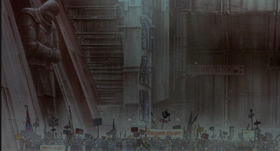


The Mob Mentality
In Fritz Lang’s Metropolis (1926) we
are shown a society of rigorous sociopolitical stratification reified in a
city of vertically stacked worlds; an underground working class supporting
a wealthy tower-dwelling ruling class. However, despite the oppressively ordered
nature of the society portrayed – at the first insinuations of unjust
treatment whispered in the ears of the workers, the entire working society
rises up in a show of violence of rage; abandoning their children to face a
flood alone to wreak havoc in the city above.
Osamu Tezuka’s Metropolis (2001), while
portraying a very different plot, maintains the dystopic themes of the earlier
version, in a politically manipulated revolt of the lower classes. These films hyperbolize their contemporary society’s
social stratification through their reification of social circumstance in vertically
layered spatial hierarchies, threatening our own recognizably repressive societies
with similarly uncontrolled eruptions of the population at large in violent
frenzies. Alphaville (1965) shows a very different notion of violence in the city, where contemporary social mores have been abandoned to the logical technocracy of a machine. The Dystopic effect in Alphaville comes
from the wide-scale of acceptance of alpha 60’s institutionalized violence,
like the pseudo-erotic poolside executions of non-conformists. Similar to the
riots portrayed in both versions of Metropolis, the acceptance of
violence by the majority represents a terrifying vision of the future which
the individual can neither anticipate or control. Violence is elevated from the ‘isolated incident’ of
the action flick to the society-wide abandonment of accepted mores, from awesome
to disquieting.
In the dystopia of the mob mentality, the individual is protected from violence only if they are careful to align themselves to the mindless press, to go with the flow or be caught in the riptide. Free will becomes a liability, lest the mob roll thoughtless over you.